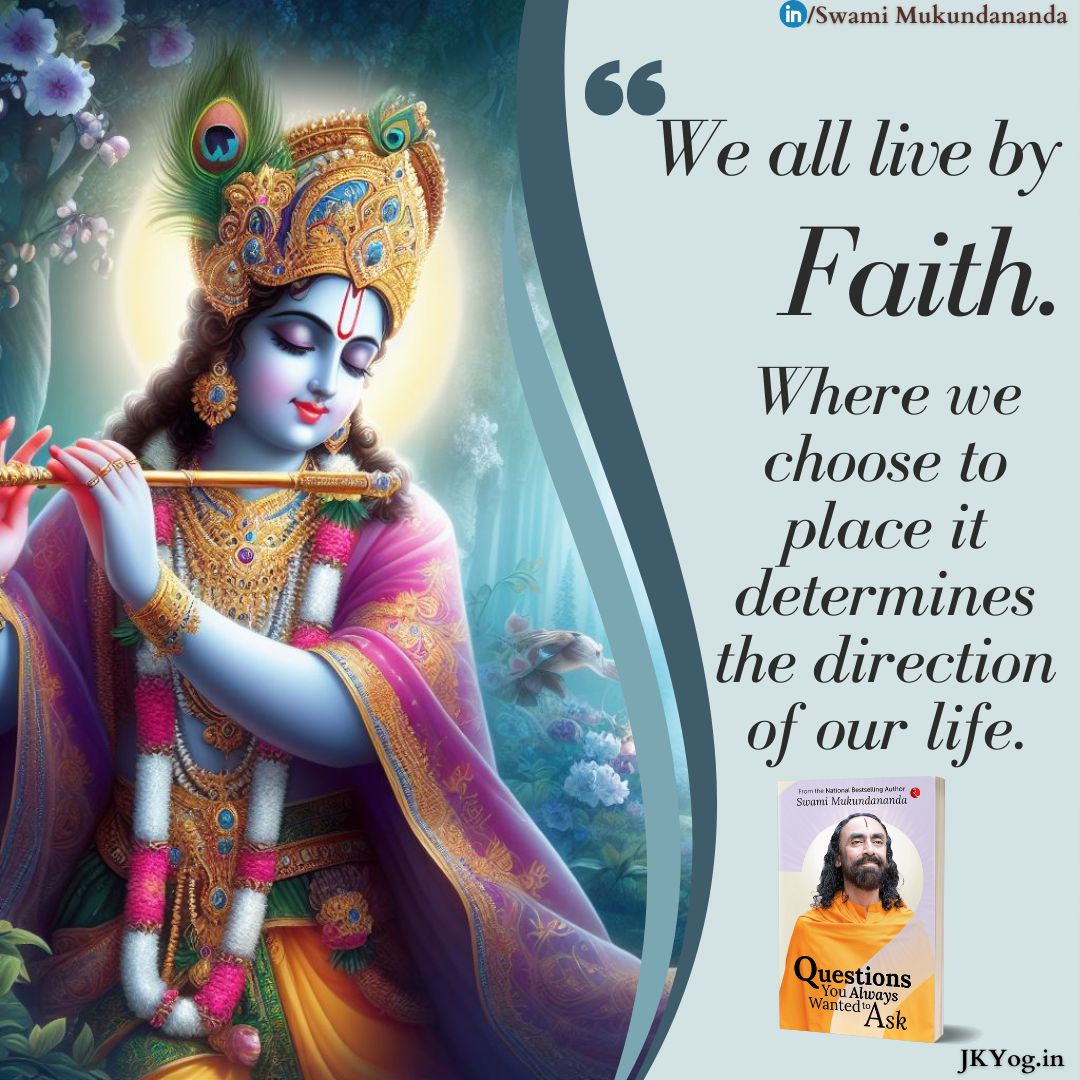Establishing Faith on the Spiritual Path

Establishing Faith on the Spiritual Path
 Quote
Quote
सत्त्वानुरूपा सर्वस्य श्रद्धा भवति भारत |
श्रद्धामयोऽयं पुरुषो यो यच्छ्रद्ध: स एव स: || 3||
sattvanurupa sarvasya shraddha bhavati bharata
shraddha-mayo ‘yam purusho yo yach-chhraddhah sa eva sah
The faith of all humans conforms to the nature of their mind. All people possess faith, and whatever the nature of their faith, that is verily what they are
 From the Editor's Desk
From the Editor's Desk
People can place their faith in many things in the material or spiritual realm. Having faith in anything is a core characteristic of human nature. It is important to ascertain that our faith is in the right source per our purpose in life.
If our faith is established on the spiritual path, it will shape the direction of our lives and equip us with the tools needed to purify the heart. We may better utilize spiritual practices like meditation and Satsang to reduce anxiety and depression, but also foster a sense of calm, provide emotional support, and most importantly, a sense of belonging to a community of like-minded individuals. Our connection to God brings psychological comfort and powerful coping mechanisms, allowing us to remain hopeful throughout life’s setbacks.
There is a sequence for developing deep faith. First, we must acquire the true knowledge of the Scriptures, which will lead to faith in God and finally result in selfless devotion and love for God.
The September issue of Inspiration focuses on Faith as a foundation for a better life. We invite your comments and experiences to learn from each other’s wisdom.
 Bhakti Ras
Bhakti RasUnderstanding the Concept of Faith
Faith is a strong belief or conviction in something without the need for evidence or proof of its existence. It is the opposite of doubt. Having faith in anything is a core characteristic of human nature.

People can place their faith in many things in the material or spiritual realm. Where we repose our faith, will shape the direction of our life. There is a symbiotic relationship between the nature of the mind and the object of our faith. If the intellect is convinced that fame, glory, or wealth are crucial for success in life, they will passionately pursue these for the rest of their lives. Thus, if we focus on the material world, we will continue to be stuck in the 8.4 million life forms.
On the contrary, when people are convinced of the importance of upholding high moral values and leading by example, their lives are dedicated toward a meaningful goal. For example, Mahatma Gandhi’s strong beliefs and faith transformed others around him when he launched the satyagrah (i.e., firmly holding on to the truth) and ahinsa (i.e., non-violence) movement. Such is the power of faith and conviction. Similarly, those who are convinced that the purpose of life is to attain God will exert all their energies toward spiritual goals. Acquiring true knowledge of the Scriptures will help us to make progress on the spiritual path to break the endless cycle of life and death. Therefore, it is important to establish our faith in the right source per our purpose in life.
Importance of Establishing Faith in God
Faith is fundamental in the practice of devotion to God, the Guru, the Scriptures, and the spiritual path itself. All of us reading this issue most likely believe in God. We might even be practicing a variety of rituals or engaging in the practice of devotion, however, at present, our faith is shallow. It waivers from time to time especially when we face challenging situations. When we firmly believe without a shadow of a doubt that God is the creator, the ocean of bliss, our eternal father, the possessor of infinite shaktis, all-pervading, seated in our hearts, and presents us with circumstances to elevate our soul, our faith will become unshakable and increase devotion and love for God/Guru. Swami Mukundananda ji beautifully explains how true faith can transform our lives.
For spiritual aspirants, it is important to establish faith in the spiritual path for various reasons:
- Foundation for Spiritual Progress. Numerous qualities that are the ingredients for spiritual practice – inspiration, trust, dedication, commitment, and devotion to serve God – all blossom from the foundation of resolute faith.
- Basis for Humility. Faith in God/Guru also enables us to develop humbleness from the knowledge-based belief that everything including our strengths and positive attributes, are gifts of God. Without Him, we are nothing. Such faith comes not from an analysis of Vedic knowledge, but from abiding beliefs, trust in the divine knowledge and the Guru who imparts it, and a strong desire to attain God.
- Conquer Mental Afflictions. Faith in true Vedic knowledge will enable us to overcome negative characteristics like fear, anxiety, false pride, greed, lust, etc. By dovetailing such traits to the Divine, devotees can neutralize their ego, similar to how Hanuman ji transferred his pride to being a profitable servant of Lord Ram.
- Build Perseverance. Faith provides us with the innate ability to persevere and stay the course instead of giving up during challenging times.
- Devotion and Love for God. As Shree Krishna told Arjun, faith in divine knowledge or the vaani of God/Guru, is essential for true and deep devotional sentiments.
श्रद्धावान् लभते ज्ञानं तत्पर: संयतेन्द्रिय: |
ज्ञानं लब्ध्वा परां शान्तिमचिरेणाधिगच्छति || 39||
śhraddhāvānllabhate jñānaṁ tat-paraḥ sanyatendriyaḥ
jñānaṁ labdhvā parāṁ śhāntim achireṇādhigachchhati
Those whose faith is deep and who have practiced controlling their mind and senses attain divine knowledge. Through such transcendental knowledge, they quickly attain everlasting supreme peace. (Bhagavad Gita 4:39)

Process for Establishing Faith in God
Many spiritual aspirants desire to build their faith in God but are unsure of the process. Those who do not believe in God, demand proof of His existence even though they are unable to prove that God does not exist. Whether we believe in the existence of God or not, we must take a leap of faith in whatever we choose to believe. Even in the material world, we take a leap of faith each time we fly an airplane, take the car to an auto mechanic, or follow the instructions of parents, teachers, doctors, or lawyers. So, how can we take a leap of faith in the power of God and His divine energies?
First, we need to understand the correct sequence of the process:

Only true knowledge of God will increase our internal faith which will lead to devotion and love for God/Guru. It is such deep faith that attracts divine grace. As Saint Tulsidas stated in his Ramcharitmanas:
जानें बिनु न होइ परतीती - बिनु परतीति होइ नहिं प्रीती
Jane binu na hoi partiti, binu partiti hoi nahi priti
“Without knowledge of God, one cannot develop faith in Him and without faith, one cannot develop love for God.”
When spiritual aspirants are hungry for divine knowledge, God bestows faith upon them out of His causeless mercy. The increased faith ignites the hunger for further knowledge which then intensifies devotion and love for God. In this cyclic process, God reciprocates the effort of souls by destroying portions of their ignorance and equipping them with a foundation to attain selfless devotion. Then, it is up to the souls to choose how they walk on the path.
For example, Meerabai’s unflinching faith in Shree Krishna made her accept the cup of poison when she was told it was the Lord’s charanamrit (i.e., nectar of His lotus feet). She drank it but did not die. Similarly, Prahlad truly believed that Lord Vishnu was omnipresent. His faith was also unshakable, thus, Lord Vishnu appeared from the stone pillar in the form of Narsinh Bhagvan and slayed Hiranyakashipu, Prahlad’s father. The day our faith in the definition of God is unshakable, we will attain God.
The power of deep faith cannot be underestimated. Faith that is firmly established on true knowledge of the scriptures is usually unshakable. If faith in God is based on positive circumstances (e.g., an increase in wealth, birth of a child), or due to a Guru’s magnetic personality, then the faith has the potential to plummet when life presents challenges, or if a Guru delivers reprimands. Our faith should remain steady or intensify especially during difficult times. This is what differentiates true from blind faith.
Faith in the divine scriptures and saints who reveal this knowledge is essential for spiritual growth. Faith should be deep, constant, and not tied to the outcomes of our actions. It is then that souls attract divine grace that further increases one’s love for God.
 Bal-Mukund: Playground for Vedic Wisdom
Bal-Mukund: Playground for Vedic Wisdom
A Struggle With Faith
Once upon a time, there was a great scholar of the scriptures. Despite possessing the knowledge, he never had a divine experience. Desperate to gain this experience, he went to a God-realized Saint to learn any spiritual practice that would bestow him with divine realization. The Saint knew the root cause of his issue immediately and smiled. He told the scholar to go outside, lift his hands towards the heavens, and cry out to God for two hours. He guaranteed the scholar would have a divine experience if he followed his instructions.
So, the scholar obediently stepped out and followed the Saint’s instructions. Unfortunately, it started raining within the next fifteen minutes and continued to pour for the remaining duration. After two hours, the scholar returned, and the Saint asked him to describe his experience. The scholar shared that his face, hair, and clothes had become drenched due to the rain. He was cold. The entire experience made him feel like a fool.
The Saint informed him that he had just received his first spiritual experience.

Practical Wisdom:
- The scholar felt like a fool. Thinking and feeling that one is a fool is the first step in the spiritual journey. The scholar had only increased his pride by learning different verses and quotations. Learning to be humble was a required lesson for his spiritual journey.
- The scholar had not yet had a divine realization. He realized there was a deficiency and chose to take a step toward practical realization. Reflecting on where one stands, and actively seeking and implementing solutions with humility helps one move forward on the spiritual journey.
- The scholar was knowledgeable but lacked faith in God. When one truly understands the relationship with God, what He does for us, and all that He will do for us when we surrender to Him, then we will be able to develop love for God. Always strive to gain knowledge. Knowledge leads to faith in God and finally results in selfless love for God.
 Youth Insights
Youth Insights
How Can We Strengthen Our Faith?
In today’s fast-paced world, it can be easy to lose sight of the deeper meaning of life, especially as we the youth, juggle school, social life, and the pressures of growing up. But faith, especially in the spiritual sense, offers us a solid foundation to navigate these challenges.
For those of us who follow the path of Sanatana Dharma (Hinduism), establishing and strengthening faith is not only a personal journey but also one deeply connected to our cultural roots.
Why Faith Matters
Faith is not just about following rituals or attending temple services. It is about developing a deep inner connection to the divine, understanding our place in the universe, and realizing the strength we can draw from our spiritual practices. Faith gives us a sense of peace and purpose, helping us remain centered even when life feels overwhelming. For us youth, it is especially powerful as it provides clarity and direction, especially during times of uncertainty.
Explore the Teachings
We can start by familiarizing ourselves with the foundational texts of Hinduism. The Bhagavad Gita, a text of paramount importance, offers timeless wisdom on how to live a balanced and purposeful life. Understanding the values and principles taught in these texts helps build a strong foundation of faith. We can start by obtaining a copy of Swami Mukundananda’s books and also listening to his videos online.
Meditation and Mindfulness
Practicing meditation regularly allows us to calm our minds and connect with our inner selves. Simple breathing exercises, chanting mantras, or focusing on a deity or principle can cultivate a deeper sense of spiritual connection. These practices are particularly useful when life becomes stressful, offering a moment of peace and clarity. As youth, starting with just 5 minutes of meditation daily can make a significant difference in how we approach challenges.

Engage in Seva
Serving others without expecting anything in return is a cornerstone of spiritual practice. Whether we volunteer at the temple, participate in community clean-ups, or tutor younger students, seva teaches humility and compassion. It is a way of living our faith in action. Volunteering at the temple or taking part in charity drives can also be a way to meet others on the same spiritual journey.
Participate in Temple Events
Going to the temple and being part of the rituals offers a sense of belonging and connection to something greater. It is an opportunity to strengthen our bond with the divine and feel a sense of community with others on the same path.
Ask Questions and Seek Guidance
Faith grows through curiosity. We should not be afraid to ask questions about the meaning behind rituals or the stories of deities. Sometimes, understanding the “why” behind our practices can help us feel more connected to them.
Build a Spiritual Routine

Faith, like anything else, requires commitment and consistency. Developing a daily routine that includes prayer, reading spiritual texts, and/or engaging in positive affirmations can help us stay connected to our path. Even simple practices, like lighting a diya (lamp) each evening or offering gratitude for the day, can ground us spiritually.
By taking small steps each day, we can build a strong foundation of faith that will support us throughout life’s ups and downs. We can walk this spiritual path together, with open hearts and minds, toward God.
 Holistic Health Titbits
Holistic Health TitbitsTrust vs. Faith in Health
When we go to doctors with a minor health issue, they make a diagnosis and prescribe a treatment. Their recommendations give us relief based on their knowledge and experience. If this interaction yields favorable results, we establish trust over time. What if we have a complex health issue with an uncertain outcome? Do we trust the doctors? Faith is an elevated form of trust requiring us to believe in something without proof or evidence. We often look to a higher power when the world does not provide the level of comfort we seek.
Swami Mukundananda reminds us that God is not a “cosmic bellboy.” It is essential that we create and maintain a faithful relationship with God so that our vessels are prepared to receive his grace in times of need.
Benefits of Faith For Our Physical and Mental Health
The path of spirituality requires cultivating and strengthening our faith through knowledge and guidance from the Guru, as well as fellowship and service. As we immerse ourselves in these practices, we begin to see their profound influence on our overall well-being.

Many find that faith provides a sense of peace and comfort during stressful times. Spiritual practices like meditation, seva, and Satsang not only help reduce anxiety and depression, but also foster a sense of calm, provide emotional support, and most importantly, a sense of belonging to a community of like-minded individuals. Our connection to God brings psychological comfort and powerful coping mechanisms, allowing us to remain hopeful throughout life’s setbacks.
Less stress in our system strengthens our immunity, reduces the risk of heart disease and high blood pressure, and minimizes responses like over-eating, lethargy, pain, and inflammation. These positive physical symptoms result in increased faith as well. Reflecting on faith and documenting how we implement it into our spiritual diaries is a helpful measure of progress. Over time, our faith will continue to evolve, and we will find new ways to implement it. When we become fortified by our belief in the Lord, challenges have less effect, and we will develop a consistent sense of joy and peace.
Spiritual Lesson
Shree Krishna tells Arjun that all people have faith, whether they realize it or not.
सत्त्वानुरूपा सर्वस्य श्रद्धा भवति भारत |
श्रद्धामयोऽयं पुरुषो यो यच्छ्रद्ध: स एव स: || 3||
sattvanurupa sarvasya shraddha bhavati bharata
shraddha-mayo ‘yam purusho yo yach-chhraddhah sa eva sah
The faith of all humans conforms to the nature of their minds. All people possess faith, and whatever the nature of their faith, that is verily what they are (Bhagavad Gita 17.3).
If we remember to utilize faith to be patient and compassionate with ourselves, develop a connection with God, and engage in acts of devotion, then, we will maintain a healthy mind and body and enhance our quality of life.
 Reflection Questions for Discussion
Reflection Questions for DiscussionBhakti Ras / Inspiration
Bal-Mukund: Playground for Vedic Wisdom
Youth Insights
Holistic Health Titbits
 Upcoming Events
Upcoming Events
The festival season at the Radha Krishna Temple of Dallas (Allen) continues to be in full swing through the end of Diwali! There are numerous events and celebrations for everyone to look forward to and participate in to experience true happiness!
Navratri & Dussehra Celebrations
The upcoming Navratri is one event that celebrates Mother Durga's myriad forms for nine days. The Mother of the Universe is filled with infinite Shaktis, but her most endearing quality is her compassion for souls caught in the endless cycle of life and death. When we seek refuge in our divine mother and surrender to her, she takes charge of our lives, protects us, and helps us to meet Shree Krishna.
Dussehra or Vijaya Dashami is celebrated on the day after Navratri, or the 10th day of this festival. On this day, devotees gather to celebrate the triumph of Shree Ram over Ravan in the Lanka war. Following a colossal war, Shree Ram slayed the 10-headed Ravan and was reunited with Mother Sita, one of the forms of the Mother of the Universe. It is also a commemoration of the triumph of good over evil, which is described in the Ramayan and many other Vedic texts.
Join us for numerous devotional and exciting free activities for ten days, from October 3 to 12, 2024. Here is the schedule of activities:
|
Date & Day |
Time |
Special Pooja or Event |
|
October 3 (Thursday) |
6:00 PM |
|
|
October 4 (Friday) |
6:00 PM 7:00 to 8:00 PM |
|
|
||
|
October 5 (Saturday) |
10:00 AM |
|
|
6:00 PM |
|
|
|
October 6 (Sunday) |
6:00 PM |
|
|
October 7 (Monday) |
6:00 PM |
|
|
October 8 (Tuesday) |
6:00 PM |
|
|
October 9 (Wednesday) |
6:00 PM |
|
|
October 10 (Thursday) |
5:30 PM |
|
|
October 11 (Friday) |
6:00 PM |
|
|
7:00 to 8:00 PM |
|
|
|
October 12 (Saturday) |
10:30 AM |
|
|
3:30 PM |
|
|
|
6:00 PM |
|
- Venue: 1450 N Watters Rd, Allen, Texas
- Details: https://www.radhakrishnatemple.net/navratri

JKYog’s Bhakti Kirtan Retreat with Swami Mukundananda ji
All JKYog devotees are extremely blessed to have the opportunity to partake in the devotional bliss of another Bhakti Kirtan Retreat with Swamiji.
We have the most wonderful opportunity to participate in a 3-day Free Bhakti Kirtan Retreat with Swamiji at the Radha Krishna Temple of Dallas (Allen). Soak in the bliss of Swamiji’s Pad Vyakhyas filled with divine knowledge and sweet ras.
JKYog and Swamiji invite you to take advantage of this incredible opportunity to purify your heart in the most serene and divine Temple location. Even though the retreat is entirely free, participants are requested to register to facilitate planning.
- Dates: October 18 to 20, 2024 (check the website for timings; the start time is 7:00 AM)
- Venue: 1450 N Watters Rd, Allen, Texas
- Details: https://www.jkyog.org/retreat/kirtan-retreat

Rath Yatra with Swami Mukundananda ji
JKYog and Radha Krishna Temple devotees are doubly blessed that the Rath Yatra is an integral part of the Bhakti Kirtan Retreat. However, everyone in the DFW metroplex can participate in this wonderful festival.
The Rath Yatra for Radha-Krishna and Jagadguru Shree Kripalu ji Maharaj is also the most memorable and divine experience for all devotees and participants! If you would like to relish the story behind the Rath Yatra, it’s there for you!
- Dates: October 19, 2024, from 4:00 to 7:00 PM
- Venue: Radha Krishna Temple of Dallas, Allen, Texas
- Details: https://www.radhakrishnatemple.net/rath-yatra

About Us
This magnificent Hindu temple is the serene abode of Shree Radha Krishna where you imbibe the nectar of love for God, celebrate festivals with the Indian community in Dallas, practice meditation and yoga, enrich your children’s lives with Vedic culture, or simply relax and enjoy the spiritual environment with your family.
Non Profit 501(c)(3)organization.
Federal tax ID:26-3490578.
Location
1450 N. Watters Road, Allen, TX 75013 (Dallas–Fort Worth Metroplex)
Phone: (469) 795-9130
Get Updates
Subscribe to our newsletter









